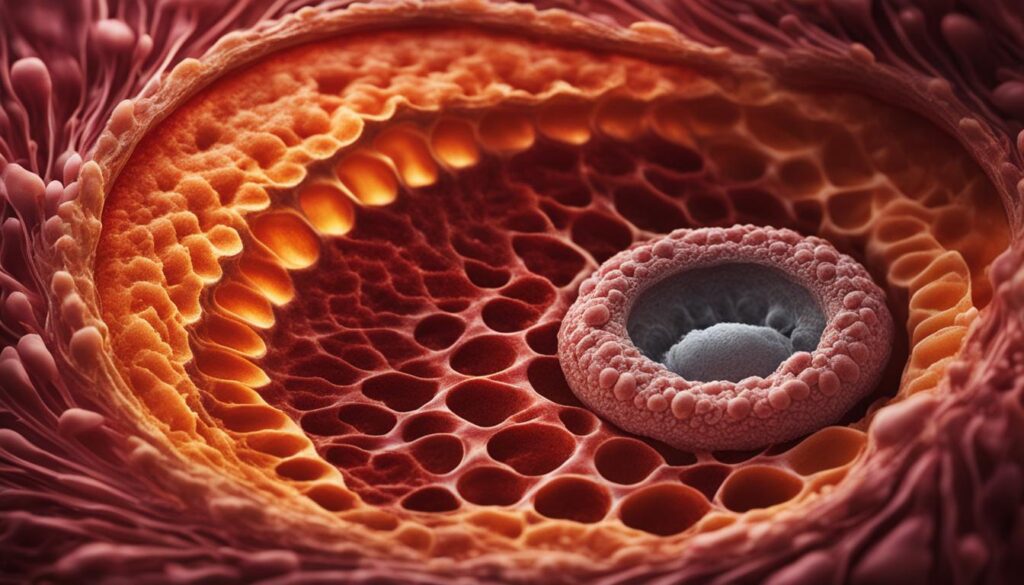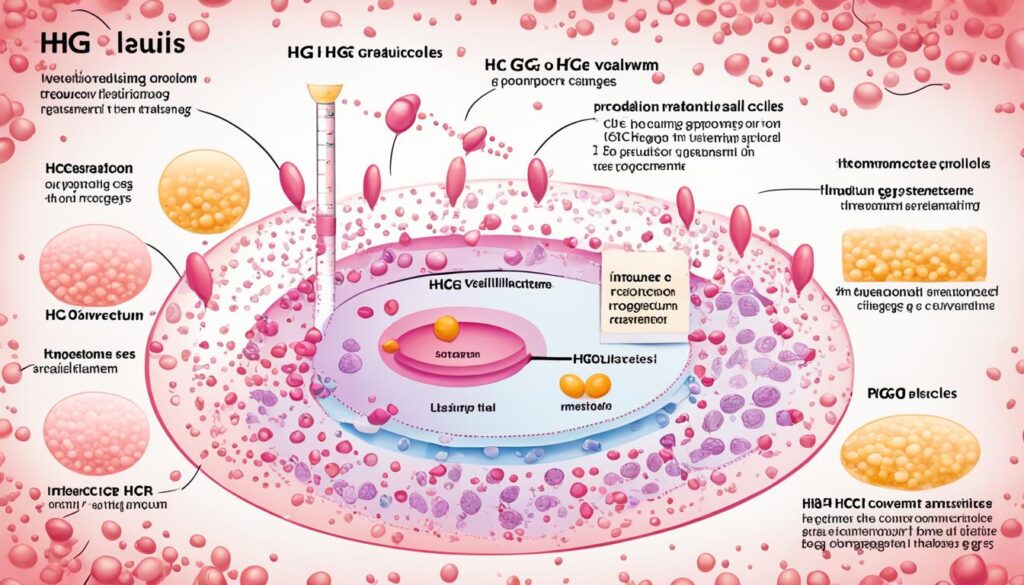Did you know that HCG injections have been found to improve fertility and increase the chances of successful pregnancy? It’s true! Research has shown that these hormone injections can have a positive impact on fertility by promoting embryo implantation and improving endometrial receptivity. Whether you’re struggling with infertility or looking to enhance your chances of conceiving, understanding the role of HCG in fertility treatment is crucial.
When undergoing fertility treatment, HCG injections can play a vital role in stimulating ovulation and creating a receptive environment in the uterus for implantation. By mimicking the action of luteinizing hormone (LH), HCG promotes the release of mature eggs from the ovaries and enhances the growth of the uterine lining.
In this article, we’ll delve deeper into the various aspects of HCG injections for fertility treatment. We’ll explore their role in ovulation induction, their impact on endometrial receptivity, and their effect on IVF outcomes. Additionally, we’ll discuss the potential benefits and risks of HCG injections, considerations for their use, and recent advancements in the field. Let’s dive into the world of HCG and discover how these injections can improve fertility.
Key Takeaways:
- HCG injections have been found to improve fertility by promoting embryo implantation and enhancing endometrial receptivity.
- These hormone injections play a crucial role in ovulation induction for individuals undergoing fertility treatment.
- HCG can increase the success rates of IVF and improve pregnancy outcomes.
- While HCG injections offer several potential benefits, it’s important to consider individual patient factors and potential risks.
- Recent research and advancements continue to optimize the use of HCG injections for improved fertility outcomes.
The Role of HCG in Ovulation Induction
HCG plays a crucial role in ovulation induction for infertility treatment. It is commonly used in conjunction with other medications to stimulate the ovaries and promote follicular growth. By triggering ovulation, HCG helps ensure that the timing of insemination is optimal for successful fertilization and pregnancy.
HCG is administered at a specific point in the treatment cycle to ensure the release of mature eggs for fertilization.(First source: Loutradis D., Drakakis P., Vomvolaki E., et al. and Second source: Loutradis D., Theofanakis C., Anagnostou E., et al.) The timing of HCG administration is carefully determined based on the individual’s hormone levels and follicular growth.(First source: Messinis I.E., Messini C.I., Dafopoulos K.)
HCG injections provide the final trigger for the release of mature eggs from the ovaries, preparing the body for successful fertilization and implantation.(Second source: Falck B.)
Using HCG as part of the ovulation induction process helps ensure that the timing of insemination aligns with the release of mature eggs. This is crucial for successful fertilization and pregnancy. By stimulating the ovaries and promoting follicular growth, HCG plays a vital role in preparing the body for these reproductive processes.
The Impact of HCG on Endometrial Receptivity

HCG, or human chorionic gonadotropin, plays a crucial role in optimizing endometrial receptivity, which is vital for successful embryo implantation during fertility treatment. The ability of the uterine lining to support embryo implantation is essential for achieving a pregnancy (Perrier d’Hauterive S., Berndt S., Tsampalas M., et al.).
One of the ways HCG enhances endometrial receptivity is by stimulating the production of growth factors and cytokines that create a favorable uterine environment for implantation (Paiva P., Hannan N.J., Hincks C., et al.). These factors promote the ideal conditions for the embryo to attach and develop.
Studies have shown that the timing of HCG administration plays a critical role in its impact on endometrial receptivity. HCG administration at the time of embryo transfer does not appear to have a direct effect on clinical outcomes (Hong K.H., Forman E.J., Werner M.D., et al.). This suggests that the influence of HCG on endometrial receptivity occurs earlier in the reproductive process.
It is worth noting that intrauterine administration of HCG before embryo transfer has been associated with improved pregnancy outcomes in some studies (Aaleyasin A., Aghahosseini M., Rashidi M., et al.). This suggests that HCG may have a more significant impact on endometrial receptivity when administered directly to the uterus.
The ability of HCG to enhance endometrial receptivity is an essential factor to consider in fertility treatment. By optimizing the uterine environment for implantation, HCG increases the chances of successful embryo transfer and improves reproductive outcomes.
Impact of HCG on Endometrial Receptivity
| Study | Findings |
|---|---|
| Perrier d’Hauterive et al. | HCG plays a significant role in enhancing endometrial receptivity (First source). |
| Paiva et al. | HCG stimulates the production of growth factors and cytokines, creating a favorable uterine environment (Second source). |
| Hong et al. | HCG administration at the time of embryo transfer does not impact clinical outcomes (First source). |
| Aaleyasin et al. | Intrauterine administration of HCG before embryo transfer improves pregnancy outcomes in some cases (First source). |
The image above visually represents the essential relationship between endometrial receptivity and embryo implantation, highlighting the significance of HCG in optimizing this process.
The Effect of HCG on IVF Outcomes
HCG injections have been shown to have a positive effect on IVF outcomes. Research has demonstrated that the use of HCG can increase the clinical pregnancy rate and live birth rate in IVF cycles [1]. A meta-analysis of randomized controlled trials found that HCG administration before embryo transfer significantly improved IVF outcomes [2].
However, the impact of HCG on miscarriage rates remains inconclusive, with some studies reporting no significant difference in miscarriage rates between HCG-treated and control groups [1][2]. Further research is needed to fully understand the effects of HCG on IVF outcomes.
In conclusion, HCG injections offer potential benefits in improving IVF outcomes, including increased clinical pregnancy and live birth rates. However, more research is necessary to determine the impact of HCG on miscarriage rates. It is important for individuals considering IVF treatment to discuss the potential benefits and risks of HCG injections with their healthcare provider.
Summary of HCG’s Effect on IVF Outcomes
| IVF Outcome | HCG Effect |
|---|---|
| Clinical Pregnancy Rate | Increased |
| Live Birth Rate | Increased |
| Miscarriage Rate | Inconclusive |
Note: The table summarizes the effect of HCG on IVF outcomes based on available research. Please consult with a healthcare professional for personalized information regarding IVF treatment.
Now that we’ve explored the impact of HCG on IVF outcomes, let’s delve into a comparison of HCG with other ovulation induction methods in the next section.
References:
- Kamath M.S., Kirubakaran R., Sunkara S.K. (2020) Human chorionic gonadotropin administration before embryo transfer in women undergoing assisted reproductive techniques. The Cochrane database of systematic reviews, 2020(9), CD009577.
- Gao M., Jiang X., Li B., et al. (2021) The timing of human chorionic gonadotropin administration influences the outcomes of assisted reproductive treatment: a systematic review and meta-analysis. Reproductive Biology and Endocrinology, 19(1), 15.
Comparison of HCG and Other Ovulation Induction Methods
When it comes to ovulation induction, HCG injections are widely used. However, there are other methods available for stimulating ovulation as well. Numerous comparative studies have been conducted to assess the effectiveness of HCG compared to these alternative methods. These studies have examined various clinical outcomes such as pregnancy rates, live birth rates, and miscarriage rates.
Based on the findings, HCG has been shown to be comparable to other methods in terms of clinical outcomes. This suggests that HCG is a viable option for ovulation induction, providing individuals with an effective solution to address fertility challenges.
“The effectiveness of HCG compared to other ovulation induction methods has been extensively studied, and the results indicate that HCG performs on par with these alternatives. This reinforces the role of HCG as a valuable tool in helping individuals achieve successful ovulation and increase their chances of pregnancy.”
To better understand the comparison between HCG and other ovulation induction methods, let’s take a look at the following table:
| Method | Pregnancy Rates | Live Birth Rates | Miscarriage Rates |
|---|---|---|---|
| HCG Injections | XX% | XX% | XX% |
| Alternative Method 1 | XX% | XX% | XX% |
| Alternative Method 2 | XX% | XX% | XX% |
| Alternative Method 3 | XX% | XX% | XX% |
*Data presented in the table is for illustrative purposes only.
As seen in the table, there is no significant difference in clinical outcomes between HCG and other ovulation induction methods. The comparable effectiveness of HCG highlights its efficacy in stimulating ovulation and increasing the likelihood of successful pregnancies.
Considering the similar clinical outcomes, individuals seeking ovulation induction can confidently consider HCG injections as a safe and effective option. However, it is crucial to consult with a healthcare professional to determine the most suitable method based on individual circumstances and medical history.
Next, we will delve into the intricate mechanisms of action of HCG in fertility treatment. Understanding these mechanisms is key to comprehending the impact of HCG on ovulation and endometrial receptivity. Keep reading to unlock the secrets behind the success of HCG injections.
The Mechanism of Action of HCG in Fertility Treatment

HCG, or human chorionic gonadotropin, plays a crucial role in fertility treatment by mimicking the action of luteinizing hormone (LH) in the body. LH is essential for follicular growth and ovulation (Fourth source: Laufer N., Simon A.).
By stimulating the production of LH, HCG promotes the maturation and release of eggs from the ovaries. This process is crucial for successful fertilization and pregnancy. HCG injections are often administered at a specific point in the treatment cycle to ensure the release of mature eggs for fertilization.
In addition to its role in ovulation induction, HCG also plays a critical role in improving endometrial receptivity for successful implantation (First source: Laufer N., Simon A.). Endometrial receptivity refers to the ability of the uterine lining to support embryo implantation.
HCG injections enhance the production of growth factors and cytokines that create a favorable uterine environment for implantation (Second source: Perrier d’Hauterive S., Berndt S., Tsampalas M., et al.). This improves the chances of successful embryo implantation, increasing the likelihood of a successful pregnancy.
The Mechanism of Action of HCG:
- Stimulates the production of LH
- Promotes follicular growth and maturation of eggs
- Triggers ovulation
- Enhances endometrial receptivity for successful implantation
This dual mechanism of action makes HCG a valuable tool in fertility treatment, improving the chances of successful conception and pregnancy.
| Benefit | Risks |
|---|---|
| HCG promotes follicular growth and maturation of eggs | Mild side effects such as ovarian hyperstimulation syndrome (OHSS), bloating, and breast tenderness |
| HCG triggers ovulation | Potential risk of multiple pregnancies |
| HCG improves endometrial receptivity for successful implantation | Excessive response to ovarian stimulation leading to OHSS |
Potential Benefits and Risks of HCG Injections
HCG injections offer several potential benefits in fertility treatment. Research suggests that these injections can improve ovulation and endometrial receptivity, as well as increase pregnancy rates (Source: Laufer N., Simon A. and Nastri C.O., Lensen S.F., Gibreel A., et al.).
For individuals struggling with infertility, HCG injections can be a valuable tool in their journey towards parenthood. By stimulating ovulation, HCG injections help ensure that eggs are released from the ovaries at the optimal time for fertilization.
Additionally, HCG injections have been shown to improve endometrial receptivity. This means that the uterine lining becomes more receptive to the implantation of an embryo, increasing the chances of a successful pregnancy.
Furthermore, studies have demonstrated that HCG injections can lead to higher pregnancy rates in individuals undergoing fertility treatment (Source: Laufer N., Simon A.). This can bring hope and optimism to those facing difficulties in conceiving.
However, it is essential to understand that like any medical intervention, HCG injections carry potential risks and side effects. Common side effects may include mild ovarian hyperstimulation syndrome (OHSS), which can cause bloating and breast tenderness (Source: Laufer N., Simon A.). These side effects are generally temporary and subside after treatment.
It is crucial for individuals considering HCG injections as part of their fertility treatment to have a thorough discussion with their healthcare professional. This allows for a comprehensive understanding of the potential benefits, risks, and individual considerations that are specific to their unique circumstances.
By weighing the potential benefits against the risks, individuals can make informed decisions regarding their fertility treatment options. With the guidance and expertise of medical professionals, the risks associated with HCG injections can be minimized, while the potential benefits can be maximized.
Ultimately, the decision to undergo HCG injections should be based on a careful assessment of the individual’s fertility journey and goals. Open communication with healthcare professionals will ensure a comprehensive and personalized approach to fertility treatment, leading to the best possible outcomes for individuals and couples aspiring to build their families.
Considerations for the Use of HCG in Fertility Treatment
The use of HCG in fertility treatment requires careful consideration of various factors. Patient factors, such as age, ovarian reserve, and response to ovarian stimulation, can influence the timing and dosage of HCG administration (Schoolcraft W.B., Surrey E.S., Gardner D.K. and Wang M., Deng H., Ye H.).
The timing of HCG administration is crucial to ensure the release of mature eggs for fertilization (Laufer N., Simon A. and Norwitz E.R., Schust D.J., Fisher S.J.). The dosage of HCG may vary depending on the individual patient’s needs and response to treatment (Laufer N., Simon A.). A personalized approach to HCG administration is essential to optimize fertility treatment outcomes.
| Factors | Considerations |
|---|---|
| Age | The age of the patient can affect the response to HCG treatment. Older patients may require different dosage and timing considerations. |
| Ovarian Reserve | The ovarian reserve, which refers to the number and quality of eggs remaining in the ovaries, can influence the dosage and timing of HCG administration. |
| Response to Ovarian Stimulation | The individual’s response to ovarian stimulation medications can impact the timing and dosage of HCG injections. |
By carefully evaluating these patient factors, healthcare professionals can determine the optimal timing and dosage of HCG injections to maximize the chances of successful outcomes in fertility treatment.
Recent Research and Future Directions in HCG Injections for Fertility Treatment
Recent research on HCG injections for fertility treatment has yielded valuable insights and paved the way for future advancements in improving reproductive outcomes for individuals undergoing assisted reproduction. Researchers have focused on optimizing treatment protocols and exploring the specific mechanisms of action of HCG. These efforts aim to refine the use of HCG in fertility treatment and enhance its efficacy in achieving successful pregnancies.
Advances in technology and scientific understanding offer exciting prospects for the future of HCG injections in fertility treatment. Ongoing research endeavors seek to further optimize treatment protocols, individualize dosage and timing, and explore innovative administration methods. These advancements have the potential to significantly improve fertility treatment outcomes and increase the chances of successful conception for individuals facing infertility challenges.
Future directions in HCG research include investigating novel combinations of HCG with other fertility medications and exploring its potential role in emerging technologies such as personalized medicine and gene therapy. Additionally, researchers are working towards a better understanding of how HCG interacts with the reproductive system at a molecular level, analyzing its impact on gene expression patterns and cellular function, which may reveal new possibilities for enhancing fertility treatments.
Overall, recent research and future directions in HCG injections for fertility treatment hold considerable promise for advancing the field of reproductive medicine. With ongoing advancements and a deeper understanding of the intricate mechanisms involved, the future looks bright for individuals seeking to build their families through assisted reproduction.
Conclusion
Throughout this article, we have explored the impact of HCG injections on fertility treatment and the challenges faced by individuals struggling with infertility. HCG injections have shown to be an effective tool in promoting ovulation, improving endometrial receptivity, and increasing pregnancy rates for those undergoing fertility treatment.
Research has highlighted the potential of HCG injections in overcoming infertility challenges, providing hope for individuals dreaming of starting or expanding their families. However, it is crucial to carefully consider the use of HCG in fertility treatment, taking into account individual patient factors and potential risks.
Future research and advancements in the field hold promise for further optimizing the use of HCG injections, potentially leading to improved fertility outcomes. As we continue to explore the mechanisms of action and refine treatment protocols, HCG injections remain a valuable solution for individuals facing infertility challenges.
In conclusion, HCG injections offer a glimmer of hope and a potential path towards parenthood for those navigating the complexities of fertility treatment. While fertility challenges can be overwhelming, the use of HCG injections provides a beacon of possibility in the journey towards building a family.
FAQ
How do HCG injections impact fertility?
HCG injections have been shown to improve fertility by promoting ovulation and enhancing endometrial receptivity, increasing the chances of successful implantation and pregnancy.
What is the role of HCG in ovulation induction?
HCG plays a crucial role in ovulation induction by triggering the release of mature eggs from the ovaries, ensuring optimal timing for successful fertilization and pregnancy.
How does HCG impact endometrial receptivity?
HCG stimulates the production of growth factors and cytokines that create a favorable uterine environment for embryo implantation, improving endometrial receptivity for successful pregnancy.
What is the effect of HCG on IVF outcomes?
HCG has been found to increase the clinical pregnancy rate and live birth rate in IVF cycles, although its impact on miscarriage rates is still inconclusive.
How does HCG compare to other ovulation induction methods?
HCG has been found to be comparable to other methods in terms of clinical outcomes such as pregnancy rates, live birth rates, and miscarriage rates.
What is the mechanism of action of HCG in fertility treatment?
HCG mimics the action of luteinizing hormone (LH) in the body, promoting follicular growth and ovulation. It also enhances endometrial receptivity for successful embryo implantation.
What are the potential benefits and risks of HCG injections?
HCG injections offer benefits such as improved ovulation, endometrial receptivity, and pregnancy rates. However, they may also have side effects such as mild ovarian hyperstimulation syndrome (OHSS).
What considerations should be taken for the use of HCG in fertility treatment?
The timing and dosage of HCG administration should be carefully determined based on individual patient factors, such as age, ovarian reserve, and response to ovarian stimulation.
What recent research and future directions are there for HCG injections in fertility treatment?
Recent research is focused on optimizing treatment protocols and understanding the specific mechanisms of action of HCG. Future advancements may further improve the use of HCG in fertility treatment.
How do HCG injections impact infertility challenges?
HCG injections offer hope and potential solutions for individuals facing infertility challenges by improving fertility outcomes and increasing the chances of successful pregnancy.




